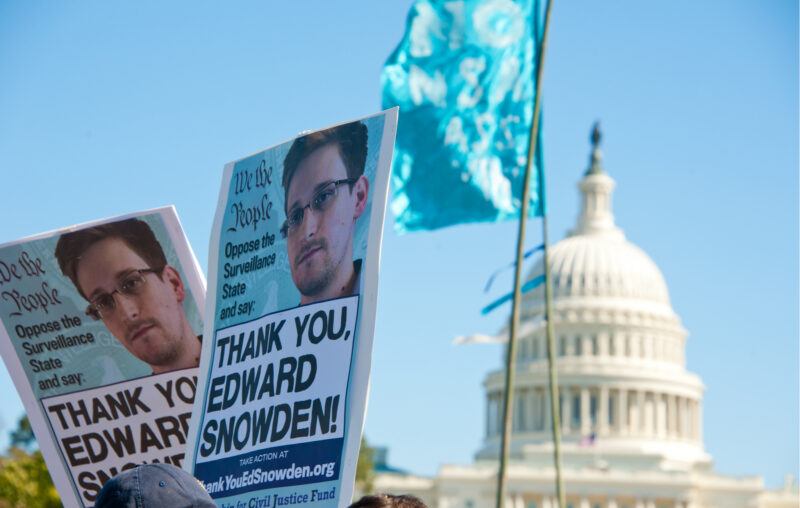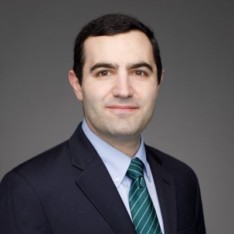Edward Snowden Deserves a Pardon

The global spotlight was cast upon Edward Snowden in 2013 after he blew the whistle on the National Security Agency’s (NSA) warrantless domestic surveillance programs. Working with The Guardian and Pulitzer Prize-winning journalist Glenn Greenwald, Snowden famously (or infamously, depending on one’s point of view) revealed that the NSA was illegally gathering information on tens of millions of Americans—citizens who had been accused of no wrongdoing. Now, Snowden’s case is once again in the news, as President Trump recently told reporters that he will look carefully at “the Snowden situation,” going as far as polling his aides as to whether he should pardon the exiled whistleblower.
Snowden was a responsible whistleblower who took the role seriously and made careful, deliberate decisions in choosing the documents he would share with journalists. He performed this immeasurably brave act of public service at an enormous personal and professional cost. In an instant, he became one of the world’s most wanted individuals, reviled as a traitor by some of the most powerful and dangerous people in the world’s most powerful and dangerous government. “Having watched the Obama administration prosecute whistleblowers at a historically unprecedented rate,” Snowden understood the risks; he understood that the CIA or “[a]ny of their agents or assets” could come after him.
Known liar Michael Hayden, for example, has called Snowden a traitor and is sufficiently shameless to argue, “Whistleblowing requires someone to actually point out a violation of law and [Snowden] has not done that.” Of course, the programs Snowden exposed were in fact quite illegal and, according to many legal scholars, unconstitutional.
Hayden, whose career has seen him hold the top spot of Director at both the NSA and the CIA, intentionally misled Congress when he testified in 2007 on the CIA’s interrogation and detention program. James Clapper, who led the intelligence community under Obama, similarly lied to Congress when, replying to a question from Senator Ron Wyden (D-OR), he stated under oath that the federal government does “not wittingly” collect “any type of data at all on millions or hundreds of millions of Americans.” Clapper, of course, knew he wasn’t telling the truth, but claimed that he “made a big mistake” and was thinking of another government surveillance program and “didn’t understand.”
Former Obama administration CIA Director John Brennan has also established a reputation for baldly lying to elected officials. In 2011, for example, he falsely claimed that the U.S. government’s drone strikes had never killed a civilian, even as he had constructive knowledge from the beginning of the Obama presidency that the drone program had killed “numerous civilians.” When Senator Dianne Feinstein (D-CA) accused the CIA of “cover-ups, intimidation and smears,” she spoke words much truer than we’re accustomed to hearing from politicians, words that go to the heart of the problem in the government: Americans are, right now, governed by a permanent power bloc of unelected, unaccountable intelligence officials—whom we might call the Deep State. As a matter of practice, they can’t be disciplined or removed, nor do they have any sense that they answer to the American people or the people’s representatives.
Under any sane standard, the country’s national security and intelligence establishment are the real traitors, selling out and betraying the American people in dangerous and misguided quests for unlimited power and knowledge about our every activity.
The top brass in the intelligence community have established a clear, decades-long pattern of violating our rights and then brazenly lying to the people’s elected representatives, forgetting that they are supposed to be public servants, not omnipotent overlords. They lie under oath and violate their sworn duty to uphold the Constitution only to turn around and accuse actual heroes like Snowden of treason. And we let them get away with it—worse than that, we celebrate them, making them expert analysts on the major news networks, awarding them cushy posts at the nation’s most prestigious centers of learning, and generally ignoring, in investigative journalist William Arkin’s words, “the creeping fascism of homeland security.”
One can’t help but be reminded of the concept of what in George Orwell’s novel 1984 the Party calls “reality control”—or in its more famous Newspeak name: “doublethink.” The ascendency of America’s military and intelligence officialdom requires that we, paraphrasing 1984, deny the evidence of our senses. Orwell’s protagonist is tortured by the mental effort entailed in forcing himself to believe two opinions he knows to be irreconcilable. “All that was needed was an unending series of victories over your own memory.”
Americans must stop ignoring our senses and our memories. If President Trump has an ounce of decency, he should promptly pardon Edward Snowden, who at a very young age, with a promising career and his whole life ahead of him, put everything on the line to protect us from the very people who are supposed to be protecting us. Let’s hope that Trump does the right thing.












